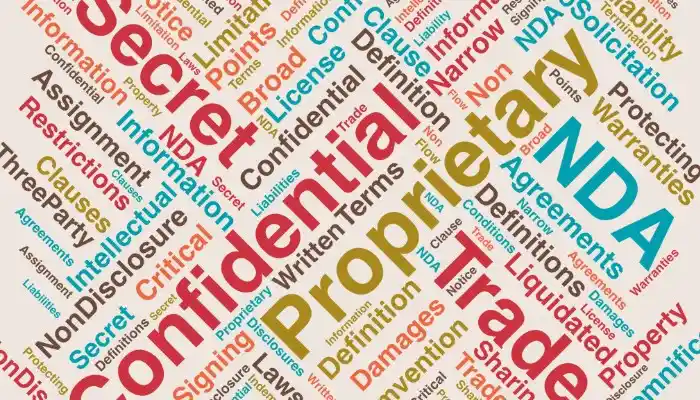Overlap of Proprietary, Confidential, and Trade Secret Terms
Understanding the differences and overlap between proprietary, confidential, and trade secret terms in contracts is crucial.
- Proprietary refers to something that belongs to a person or company.
- Confidential means something that is kept secret.
- Trade Secret is a legal term referring to information that is not publicly known and has economic value because it has been kept secret, with the owner making reasonable efforts to maintain its secrecy.
Definitions of Confidential Information
The definition of confidential information can be broad or narrow, depending on the client’s situation. Some companies prefer a broader definition to protect a large volume of confidential information, believing they can effectively safeguard any information received from disclosure.
Others may prefer a narrower definition, as they are concerned about receiving valuable trade secrets from others.
- A narrow definition could be: “Information labeled as confidential or, if disclosed orally, identified in writing as confidential within 48 hours.”
- A broader definition might be: “Any information received from one party or its representatives that is not listed in the exceptions.”
- An intermediate definition is: “Any information that a reasonable person would understand to be confidential because it is identified as such or the circumstances of disclosure indicate it.”
Critical Points in Non-Disclosure Agreements (NDAs)
Non-disclosure agreements (NDAs) are important but come with their own risks. The risks increase when these agreements include unusual provisions that expose one party to greater liability or limit their remedies.
- Liquidated Damages for Breach: Breaches of NDAs are often complex. Liquidated damages are appropriate for objective breaches (e.g., late delivery).
- No-Solicitation Clause: Including this clause in an NDA is premature. The parties are still in the early stages of discussions.
- Limitation of Liability: These clauses are very risky. They assign a price to taking and using the information for the other party.
- Intellectual Property License or Assignment: Combining NDAs with licensing terms is not a good idea. If a license is needed, sign a more comprehensive agreement with the full scope of terms.
- Non-Circumvention: These obligations do not belong in a standard NDA. If the relationship is truly strategic, include these provisions in a more complete agreement.
Indemnification in Non-Disclosure Agreements
Indemnification clauses should not be included in non-disclosure agreements (NDAs).
- In complex commercial contracts, there is a set of rights and obligations that involve the construction, delivery, and use of a product or service, with a significant exchange of value and comprehensive terms regarding liability and risk.
- In contrast, an NDA simply states that confidential information should not be used or disclosed. There is no economic exchange, and the interaction and relationship are limited.
In this context, indemnification appears to be an inappropriate transfer of risk. In the event of a breach, the injured party can sue for damages and receive compensation after proving the case.
Warranties in Non-Disclosure Agreements
In commercial NDAs, a warranty on the accuracy of information is commonly addressed.
- This clause states that the disclosing party does not guarantee that the information is accurate or complete and advises the recipient not to rely on it.
- Additionally, a warranty that the disclosing party has the right to share the information is also acceptable. This clause gives the recipient the right to take legal action if the disclosed information violates a third-party contract or infringes on third-party intellectual property.
After Signing a Non-Disclosure Agreement
Once a Non-Disclosure Agreement (NDA) is signed, don’t set it aside thinking you’re fully protected.
- The NDA is a contract that protects your information and allows you to use the other party’s information in a limited way, but only if you adhere to the terms of the agreement.
- Do you need to send a written notice after each meeting to declare the information as confidential?
- Do you know the restrictions on sharing the other party’s information with your advisors and contractors?
Understanding these agreements thoroughly and complying with them are crucial steps in safeguarding your trade secrets and confidential business information.
Protecting Confidential Information
Most lawyers and businesspeople know that trade secret laws protect certain business information, and that NDAs and confidentiality clauses in other contracts also offer protection. However, understanding the relationship between these two can be confusing.
Trade secret laws protect information that is not publicly known, has economic value, and is kept secret through reasonable efforts by the business. This protection applies even without a contract. Confidentiality clauses in NDAs or other types of contracts only protect information to the extent specified in the clauses.
Three-Party Non-Disclosure Agreements
Three-party NDAs only work if they are carefully drafted to address the complexities involved.
- It must be clear how disclosures and liabilities flow between the parties.
- Can Party A share information received from Party B with Party C? If Party C then breaches the NDA, is Party A liable?
- What about termination? Most three-party NDAs I’ve seen use the same termination language as bilateral agreements. If Party A terminates for convenience, does the entire agreement end? Or if Party A breaches, can Party B immediately terminate the agreement even if Party C disagrees?
To address these scenarios, the terms of the agreement must be clearly defined to cover the various situations that arise from having three parties. For several reasons, it’s often preferable to stick to bilateral NDAs. This approach keeps relationships clearer and makes managing the flow of information easier.
Source: Frederick, L. (2022). Practical Tips on How to Contract: Learn How to Draft and Negotiate from a Former Big Law and Tesla Commercial Contracts Lawyer. How to Contract LLC.





